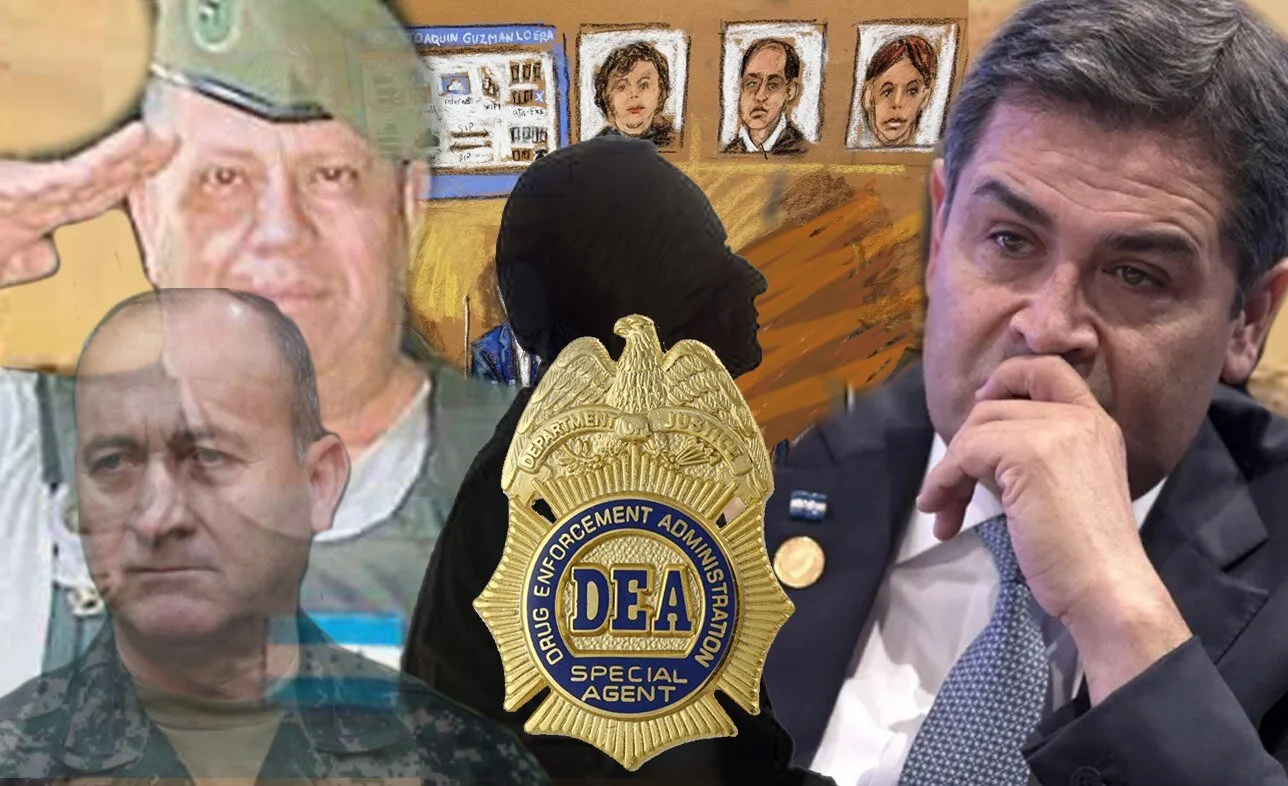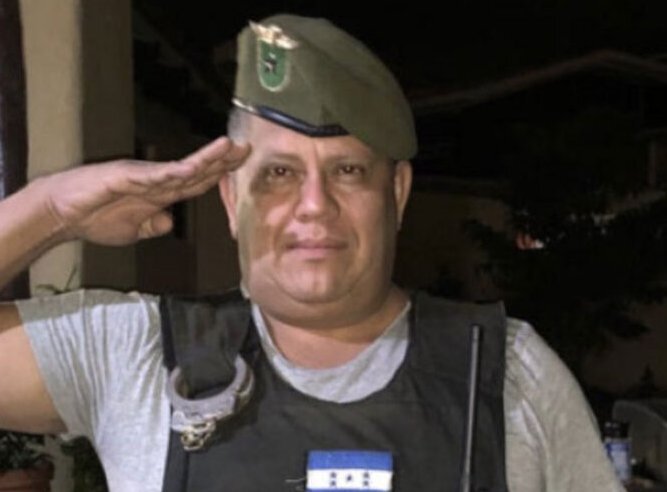DAY TWO: Trial Against Honduran Geovanny Fuentes Ramirez, business partner of Honduran President Juan Orlando Hernandez
/What Happened Today:
Opening remarks
First witness was called: DEA Special Agent Brian Fairbanks
Key Details that Surfaced:
Geovanny Fuentes Ramirez’s (GFR) business thrived because of his connections to police, military and political power in Honduras including with mayors, Congressional representatives, military generals, and police chiefs.
GFR gave President Juan Orlando Hernandez $25,000 in cash, and access to his cocaine lab. In exchange, the President agreed to shield him from prosecution “with help from the Attorney General [Oscar Chinchilla].” (words of US prosecutors)
GFR carried a green machine gun with him that was given to him by a Honduran Military general
A Honduran accountant named Jose Sanchez, who worked with a business used by GFR to launder drug money, will testify about GFR’s meeting with Honduran President Juan Orlando Hernandez and witnessing GFR bribe a Honduran judge, amongst other details.
Honduran agro-industrial businessman, Fuad Juan Jarufe Larach, is GFR’s business mentor that made contributions to President Juan Orlando Hernandez’s political campaign. He introduced GFR to the President, the Vice President, and members of the Honduran military
GFRs had repeated communication with police and military officials and also, contact information of:
Conversations with Police Commissioner Ramon Martinez Hernandez and ‘Comanche’ believed to be a member of the Honduran military
Contact information for Police Commissioner Martinez Alvarado, Police Commissioner Sauceda [jailed in Honduras accused of money laundering]; Juan Orlando Hernandez; Military Colonel Amilcar Hernandez [JOH’s brother]; businessman Fuad Jarufe; Military General Rene Ponce Fonseca [Former Commander of the Joint Chief of Staff of the Honduran Armed Forces]; Manuel Zelaya; Ricardo Alvarez, etc.
What Will Happen Tomorrow:
DEA Special Agent Brian Fairbanks will continue being crossed by the defense
More witnesses will be called (unclear who they will be)
Picture from the Pro-Honduras network
More Details
US Prosecutor’s Opening Remarks
GFR’s drug business thrived because of his connections to police, military, and political power including with mayors, Congressional representatives, Military Generals, and Police chiefs.
Those he could not buy, he would kill.
The Drug Lab & Landing Strip(s)
In 2008, GFR began selling 1, 2 or 5 kilogram amounts of cocaine in Miami. He started his drug lab in 2010. He paid dozens of armed men to guard the lab. His lab was raided in 2011 by law enforcement. One of the officers involved in the raid was later kidnapped, tortured, and stabbed to death. He transported cocaine using air strips in Honduras.
Relationship and Meetings with President Juan Orlando Hernandez (JOH)
GFR had secret meetings with the President of Honduras in 2013 and 2014 where they plotted to send as much cocaine as possible to the US.
He gave the President, $25,000 in cash and also access to his cocaine lab. In exchange, the President agreed to shield him from Prosecutors with help from the Attorney General [Oscar Chinchilla]. GFR would later team up with President JOH’s brother, Tony Hernandez.
With the President’s help, GFR’s drug business flourished. He began carrying around a green machine gun that was given to him by a Honduran General.
What’s To Come From the Government:
Expert witnesses that will testify during the trial for the US government:
Devis Leonel Rivera Maradiaga, confessed drug trafficker in prison in the US and part of the Los Cachiros cartel.
Jose Sanchez, who worked with a business used by GFR to launder drug money. He will testify about GFR’s meeting with the Honduran President, about the drug lab, how he delivered pay roll to GFR’s armed bodyguards, and how he saw GFR bribe a Honduran judge, amongst other details.
A veteran witness that will discuss how drugs are produced in Colombia;
An expert in Honduran history, who will describe the Honduran political system;
An expert in machine guns who will testify about the weapons that GFR used to protect his drug trafficking business;
Other witnesses involved in law enforcement including testimony from a DEA agent.
Photos and chats taken from the two cell phones that were seized from GFR when he was arrested as well as the ICloud account of GFR’s son, Geovanny Fuentes Gutierrez.
Opening Statements from the Defense, Eylan Schulman
The government’s case depends on the testimony of “one of the most vicious murderers to have ever walked on this earth” (referring to Devis Leonel Rivera Maradiaga). These are self-interested witnesses with “too much to gain and too little to lose.” How can the US government rely on such testimonies?
The US government enjoys a special relationship with Honduras – It’s a cheap trading partner, the two governments share information and work together to address regional challenges.
President Hernandez agreed to send individuals that violated US laws (extradition) to US to stand trial.
GFR is 51 years old, he has 3 children – 3 sons (Geovanny, Christian and Jose Simon) from a previous marriage, and 5-year old daughter with his current wife of 6 years. He has 4 grandchildren. He had a business converting wood into energy.
He had to carry firearms to protect himself in a “violent and dangerous country.” He had licenses to carry these weapons. As his business became more successful, he had bodyguards to protect him, which was not unlike what other successful businessman did in Honduras.
Honduran agro-industrial businessman, Fuad Jarufe, is GFR’s business mentor that made contributions to President Juan Orlando Hernandez’s political campaign. He introduced GFR to the President, the Vice President, and members of the military.
NOTE: Fuad Juan Jarufe Larach is family (although unclear how) to the wealthy and powerful Canahuati Larach family involved in media, sweatshop, industrial and construction supplies industry, etc in Honduras. Fuad Jarufe is the owner or a major shareholder in Grupo Jarufe that is composed of three companies: GRANSA, ARDESA, and AGRIMONSA.
GFR is from the small city of Choloma. His son (Christian Fuentes Gutierrez) is married to the daughter of confessed drug trafficking jailed in the US, Javier Rivera Maradiaga or the niece of Devis Leonel Rivera Maradiaga (who will testify for the government in this trial)
The government will show pictures of drugs and money but they could have come from anywhere. The government doesn’t have drug ledgers, pictures of GFR with drugs, police reports linking him to violence, etc.
Witness Testimony: Special Agent Brian Fairbanks, Special Operations Division, Drug Enforcement Agency (DEA)
Has been working as a special agent since 2009. First assigned for 6.5 years in Nogales, AZ, then to Tucson, AZ for approx.. 2.5 years, and then the Special Operations Division in Virginia. Assigned to the Bilateral Investigations Unit which conducts large scale international drug trafficking investigations.
Arrested GFR on March 1, 2020 in the Miami International Airport.
Information from GFR’s Cell Phone & his son Geovanny Fuentes Gutierrez’s ICloud Account
GFR was arrested with two cell phones – one IPhone and a Samsung – which contained a series of Whatsapp chats and voice messages, and photos.
Many pictures were found on GFR’s phone. Some of these pictures are compared with other pictures found in GFR’s son’s ICloud account. A lot of pictures were found on the phone, some of them included pictures of:
GFR, one of his sons and John Frederick Jarufe [family member of Fuad Jarufe]; Juan Orlando Hernandez with GFR’s brother, Christian Fuentes [running as a pre-candidate for Congress for the National Party], and Ana Garcia de Hernandez, JOH’s wife; Ramon Martinez Hernandez (Police Commissioner); and pictures with Commissioner Ramon Martinez Hernandez with one of GFR’s sons.
Several photographs of weapons (AK-15 style rifle, shot guns, 9 mm weapon, a green and black AR-15-style rifle with a magazine with ‘United States Navy” on it, a gold pistol) and weapon accessories (magazines, muzzle reducer slash, gun cases, etc)
People holding heavy weapons including a man with a gold watch which is similar to the watch found on GFR when arrested.
Screenshots of a Whatsapp communication
Cash in US currency and other foreign currencies.
Other Things Found on GFR’s phone and son’s ICloud account and Instagram Account:
Whatsapp conversations with: “Christian Bienes Raices”
Several phone contacts including Juan Orlando Hernandez’s cell phone number and email address. JOH’s information on GFR’s phone was verified with JOH’s 2011 US visa application.
Phone number of Honduran Police Commissioner Martinez. This information was verified with a US visa application submitted by Ramon Alberto Martinez Hernandez who described himself on the application as working with the Honduran National Police.
Photos of more weapons and several photos of weapons with text referring to “sapos” (In Spanish) that mean ‘snitches’ in English.
Other contacts including: Mel Zelaya, Ricardo Alvarez, Juan Orlando Hernandez.
Evidence introduced from open source LinkedIn profile of Ramon Martinez Hernandez: Pictures of Ramon Martinez Hernandez “visiting the Director of the Carabineros of the Chilean National Police”; Ramon Martinez Hernandez with Juan Orlando Hernandez; a picture of a pin with caption “UN Course for Police Observers”; certificate in Ramon Martinez’s name from an “international course in Best Policing Practices”
Whatsapp Chats between Police Commissioner Ramon Martinez Hernandez and GFR
One chat is the Commissioner telling GFR how to detect if his phone has been tapped (Date: February 25, 2020). GFR then passed this information to his son and verified by messages found on GFR’s son’s ICloud account
Another chat with Police Commissioner to GFR’s son, Geovanny Fuentes Gutierrez describing the murder of three individuals in Cortés inside a white truck.
Whatsapp Chats with GFR & ‘Comanche,’ a member of the Honduran military
Whatsapp chats dated October 29, 2019. Discussing how things are getting ugly in Honduras after drug-related murders occurred.
Whatsapp chats dated November 6 and 7, 2019: Sharing an preliminary report about the violent murder of a man by firearm in San Pedro Sula in July 2019. The killing was a death squad like killing where people dressed in anti-gang forces shot four people inside a vehicle. The report names Deputy police inspector Jason Quintanilla and driver, Alex Herrera. Comanche share pictures of the dead bodies.
Other Contacts of Police and Military on GFR’s Phone:
Police Commissioner Martinez Alvarado, Police Commissioner Sauceda [jailed in Honduras accused of money laundering], Juan Orlando Hernandez, Military Colonel Amilcar Hernandez [JOH’s brother]; businessman Fuad Jarufe; General Ponce Fonseca; ‘Comanche’ (believed to be a Honduran military official)
Connections to Honduran Investors in AgroIndustrial Business
A photo of an ATIC investigative document was found on GFR’s phone. It was dated June 14, 2016 and was a request from the San Pedro Sula to the Chief of Police in Choloma, Cortés for more information about agroindustrial business man Fuad Jarufe and members of his family including Jacqueline, Janine, John Frederick, Jorge Farad, etc. They were subject to a criminal money laundering investigation.






